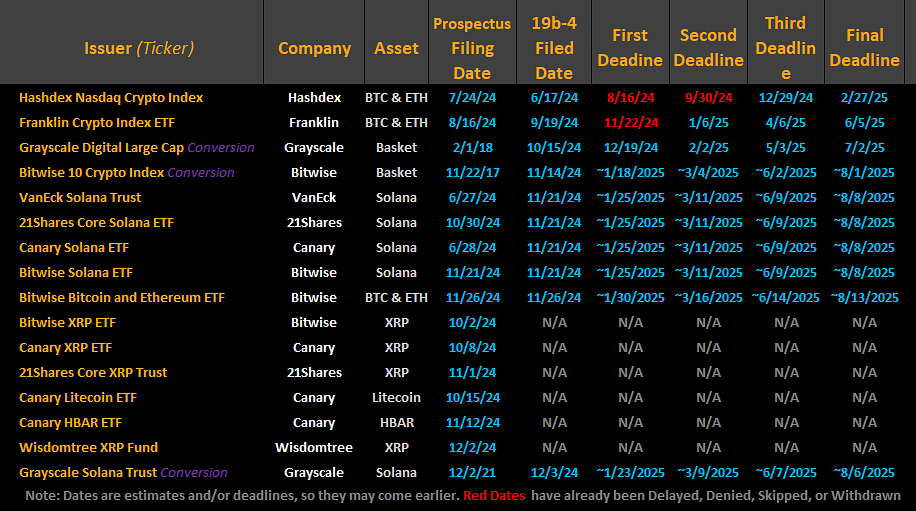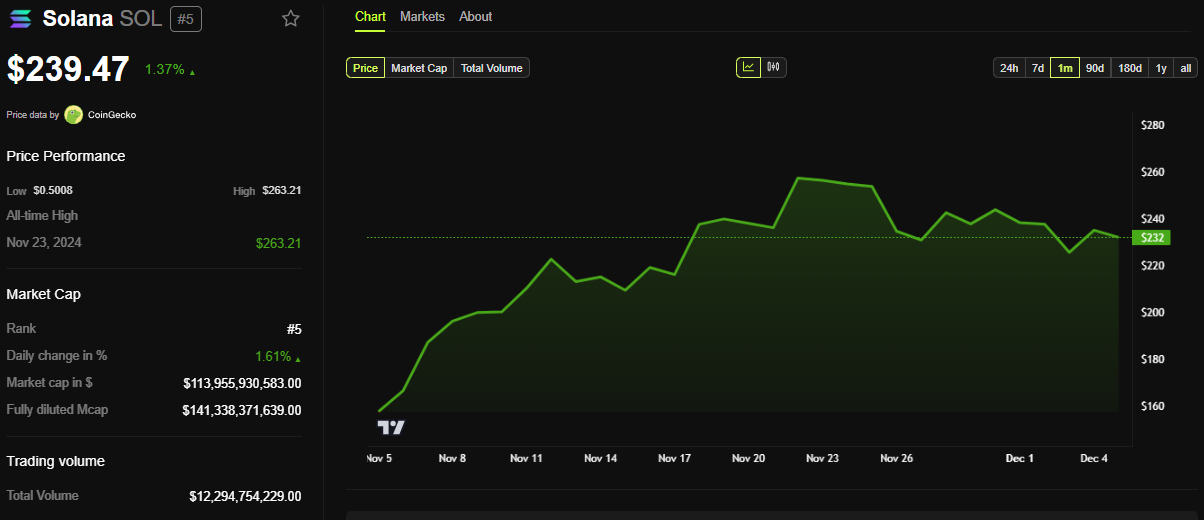[ad_1]
According to recent revelations, the likelihood of the US Securities and Exchange Commission (SEC) approving the Solana ETF in the near future has decreased significantly.
Fox Business reporter Eleanor Terrett reported that the SEC has notified at least two of the five companies that applied for the Solana ETF that their applications will be rejected.
Odds of Solana ETF Approval Are Very Low
According to Terrett, the SEC has indicated to at least two of the five potential issuers that they will reject 19b-4 filings for the Solana ETFs.
“The consensus here, I’m told, is that the SEC will not approve any new crypto ETFs under the current administration,” Terrett write.
This development marks a clear reversal from previous optimism. Just a few days ago, reports suggested that negotiations on the Solana ETF were progressing well and that approval could be within reach.
However, the latest signal from the SEC suggests that the regulator is still hesitant to expand crypto-related ETFs beyond Bitcoin and Ethereum, the only two currently approved digital asset ETFs in the United States.
Solana is one of many altcoins whose ETF filings are still on hold. Along with Solana, applications for the XRP ETF, HBAR and Litecoin are also being reviewed.
Filing Form 19b-4, which establishes the SEC review period, is an important step in this process. However, James Seyffart of Bloomberg Intelligence point out that many candidates have not yet reached this stage, as indicated by the timelines marked “N/A.”

Bitwise, Canary Capital, and Grayscale recently made headlines with their Solana ETF filings. Meanwhile, VanEck and 21Shares have cooperated in proposing to Cboe, demonstrating widespread institutional interest in the Solana ecosystem.
Despite this momentum, a lack of regulatory clarity continues to burden the market, with the likelihood of approval for the Solana ETF reportedly falling to just 3% three months ago.
Many see SOL-based ETFs as the natural next step in Solana’s evolution, opening the door to broader investor availability and liquidity. However, the SEC’s strict stance reflects the challenge of achieving this under the current regulatory framework. With many applications already rejected or pending without a clear timeline, the debate over the Solana ETF represents a broader struggle between innovation and oversight in the crypto industry.
Political and Regulatory Changes Could Change the Situation
The SEC’s opposition to expanding crypto ETF approvals reflects the current administration’s cautious approach to digital assets, led by Chairman Gary Gensler. However, changes in politics and leadership could change this dynamic.
President-elect Donald Trump has expressed a crypto-friendly stance that some experts believe could pave the way for more adaptable policies. Analysts suggest that the Trump administration could create a more favorable regulatory environment for digital assets, especially with a crypto-friendly SEC chairman like Paul Atkins.
This change could rekindle hopes for Solana and other altcoin ETFs that are currently stalled.
“Solana’s biggest win under the new Trump era will be the ETF we’ve been waiting for since 2025 or 2026. Not surprisingly, VanEck’s great team will lead this assault with support from 21Shares and Canary Capital,” speak Dan Jablonski, head of development at news and research company Syndica.
Despite regulatory hurdles, Solana continues to demonstrate strong ecosystem growth. As of press time, SOL is trading at $239.47, up 1.37% on the day. This blockchain stands out for its high throughput and low transaction costs, attracting interest from institutional investors.

Following the appointment of a new SEC chairman in the wake of Gensler’s resignation and with Trump’s inauguration approaching, the potential for significant regulatory changes is becoming apparent. These developments could usher in a new era of cryptocurrency adoption, opening the door for Solana and other altcoin ETFs. Until then, the road to approval remains fraught with uncertainty.
General Bitcoin News
[ad_2]



